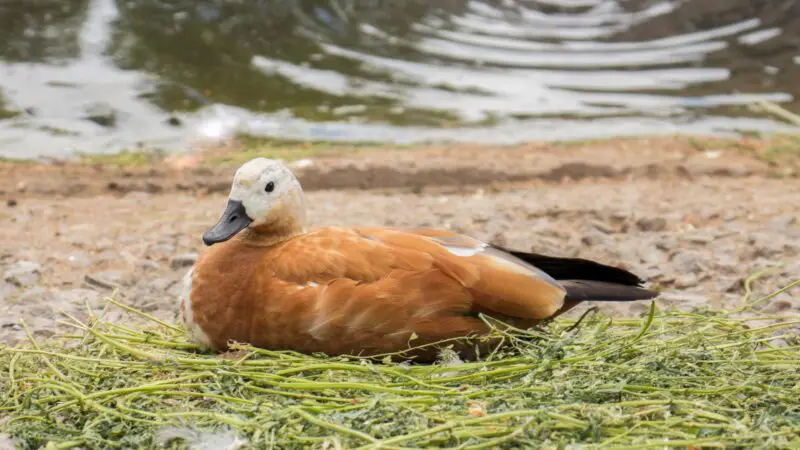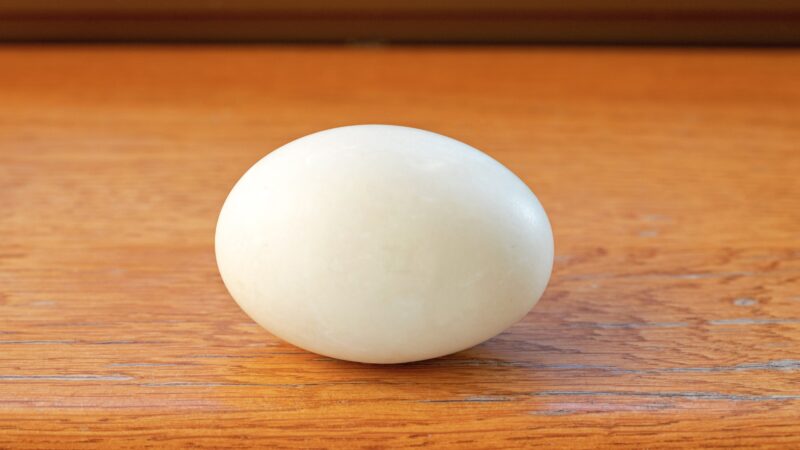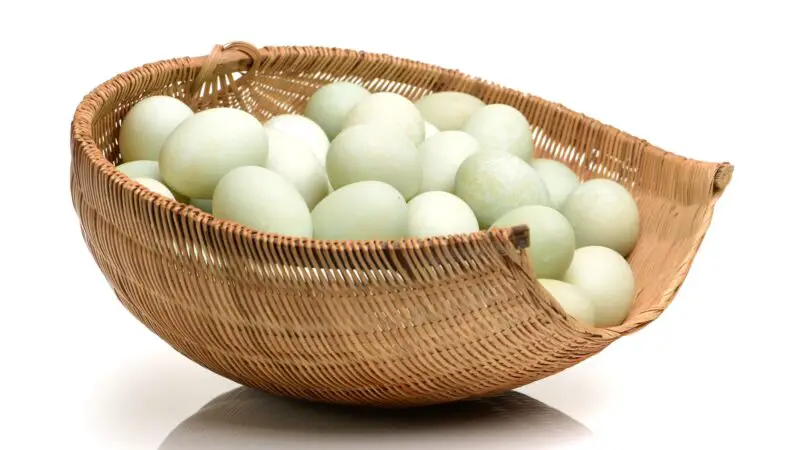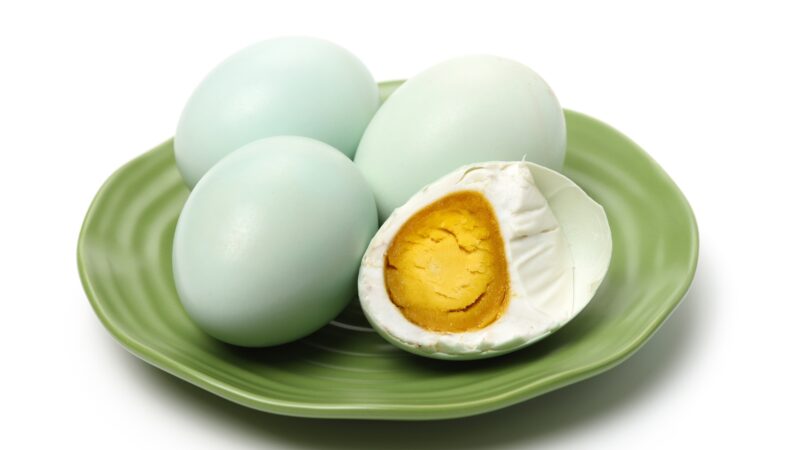Whenever you think of eggs, you often assume that they’re referring to chicken eggs. After all, chicken eggs are quite common wherever you go.
But, have you ever considered eating duck eggs? If you’re interested, you’ll find all the information you need about duck eggs in this article.
Duck eggs are healthy to eat. Recent studies reveal that duck eggs contain nutrients like B vitamins, vitamin D, manganese, iron, protein, and vitamin A, to name a few. In fact, duck eggs contain even more protein, vitamin A, and antioxidants than chicken eggs.
With that said, there’s no denying that duck eggs are good for you. But, what do duck eggs taste like? How are they cooked? These are just some of the questions you want answers to. And lucky for you, this article will provide you with the answers.
Do Ducks Lay Eggs? When Do Ducks Start Laying Eggs?

Ducks lay eggs. Ducks, like other birds, belong to the Aves class of animals. These animals lay their eggs for reproduction. Interestingly, these animals lay their eggs whether or not they have been fertilized by sperm from the male species.
Since the purpose of laying eggs is for reproduction, ducks start laying eggs once they are mature enough to do so. Most duck breeds start laying between the age of six and seven months, while small duck breeds start laying earlier at around four to five months old.
How Often Do Ducks Lay Eggs? How Many Eggs Do Ducks Lay?
Ducks are excellent egg layers. In fact, commercial ducks are known to lay more eggs than commercial chickens.
During its laying cycle, a single duck can lay one egg every 24 to 48 hours. This translates to around 250 to 350 eggs in a year. In contrast, a chicken raised specifically for egg production can only lay up to 250 eggs per laying cycle.
However, it must be noted that the numbers stated above are a generalization. The number of eggs produced by a single duck still depends on the species.
For example, mallard hens are known to be bad egg layers, only producing around 60 eggs per year. On the other hand, Campbell and runner ducks are the best options for duck production since they can lay between 300 to 350 eggs per year.
Where Do Ducks Lay Eggs?

Ducks lay their eggs on nests. They prefer to create their nests near bodies of water, so they don’t have to leave their eggs for a long time. At this point, it’s easy to see how ducks are protective of their young.
Wild ducks make their nests by creating a shallow impression on the ground that’s about a foot in diameter. She will be adding leaves from nearby vegetation to provide cushioning for her eggs.
Once she lays her eggs, she will be sitting on them for most of the day – and only take three one-hour-long breaks to make sure they’re safe and warm.
In contrast, domesticated ducks often make do with making their nests inside the coop and adding dried hay to serve as cushioning. But in the case of domesticated ducks, make sure they always have enough clean water to drink and bathe in.
Another interesting fact about mother ducks is that they pluck their down feathers and use them to cover the eggs whenever they need to take a break. Down feathers give ducks added insulation, so covering their eggs with them keeps the eggs warm.
What Do Duck Eggs Look Like?
Duck eggs look like any other egg. They come in different sizes and colors, but the most common shell color is white with a bluish tint. Some duck eggs also appear off-white or dark gray, depending on the duck species.
To compare duck eggs with chicken eggs, the average duck egg is about 0.5 ounces heavier than the average chicken egg. It also appears more elongated, while the chicken egg looks rounder.
Additionally, duck eggs have thicker shells that are harder to crack. If you find yourself exerting more effort in cracking an egg, there’s a big chance that the egg you’re holding is that of a duck.
On the inside, the biggest tell-tale sign of a duck egg is its larger egg yolk. This means it has less albumen, or the white part in the egg, compared to chicken eggs. The duck egg yolk also has a golden orange appearance, as opposed to the bright yellow or pale yellow yolk of a chicken egg.
Can You Eat Duck Eggs? How Do They Taste?

You can eat duck eggs. However, it is not advised to eat them raw. Allow them to cook and reach a temperature of at least 160 degrees Fahrenheit before consuming them.
Duck eggs are rich in nutrients and antioxidants, making them a healthy food option. While its bigger yolk means that it contains more cholesterol than that of a chicken egg, the difference is only minimal. Plus, it also has more vitamin A and omega-3 fatty acids, so it’s still the healthier alternative.
Interestingly, duck eggs have a stronger taste than chicken eggs – and this is stated in a good way. Because of their bigger yolk, duck eggs have a creamier flavor to them. That’s why duck eggs are highly favored by pastry chefs.
Why Are Duck Eggs in Different Sizes?
Like all species, duck eggs have different sizes because ducks come in different sizes. It follows that small and medium-sized ducks usually lay average-sized eggs, while large-sized ducks lay large eggs.
Are Duck Eggs Good for You?

Duck eggs are good for you. While duck eggs have slightly more fat and cholesterol content than chicken eggs, it is still quite nutritious.
It contains protein, omega-3 fatty acids, a variety of B vitamins, vitamin A, vitamin D, magnesium, and iron, to name a few. It also contains a variety of antioxidants to serve as added protection for your cells and muscles.
Do the Size of Duck Eggs Affect Their Nutritional Contents?
In a way, the size of duck eggs has an effect on their nutritional value in the sense that bigger eggs contain more vitamins and minerals. However, considering that the difference in egg sizes is minimal, it follows that the changes in the nutritional contents are also quite minimal.
How to Cook With Duck Eggs?

Duck eggs are cooked the same way as chicken eggs. The following are the ways by which you can cook duck egg:
- Boil. Boiling duck eggs is the easiest way to cook them. Just like chicken eggs, you can either cook them as soft-boiled or hard-boiled. In some Asian countries like the Philippines, fertilized duck eggs are boiled or steamed and eaten as a snack with added therapeutic value.
- Fried. Duck eggs can also be fried, and can either be scrambled or fried sunny-side-up. Because of its bigger yolk, scrambled eggs are usually fluffier.
- Used in baking. Perhaps the most popular way to cook duck eggs is when they are used for baking pastries. Aside from their creamier taste, duck eggs also help the dough rise higher.
Related Questions
How Long Does It Take for Duck Eggs to Hatch?
The average time for ducks to hatch is around 28 days. This is especially true for common breeds like the Pekin duck. However, this number may be longer or shorter, depending on the particular duck breed you have. Expect a range between 25 to 35 days for hatching duck eggs.
Do Duck Eggs Taste Like Chicken Eggs?
Duck eggs have a similar taste to chicken eggs. However, it must be noted that duck eggs have a bigger yolk, giving them a stronger taste.
Depending on how the duck eggs are cooked, the yolk also gives them a creamier flavor. This is why duck eggs are favored by chefs for baking pastries.
How to Incubate Duck Eggs?
If you’re planning to hatch your duck eggs, then the best way to ensure they hatch is to incubate them. Before teaching you how to incubate duck eggs, make sure you already have an incubator.
If you’re new to incubating eggs, it would be best to own one that allows you to adjust the temperature and humidity and easily monitor the eggs inside. A good example is the Manna Pro Harris Farms Nurture Right Incubator, which offers a 360-degree view of the eggs, induced airflow, and automatic egg turning.
Step 1: Prepare the incubator.
Before anything else, make sure the incubator is turned on. Set its temperature to 99.3 to 99.6 degrees Fahrenheit and the humidity to 55 percent. It’s best to wait for a day before setting the eggs inside to ensure the stability of the humidity and temperature.
Step 2: Egg selection.
Once the incubator is ready, you have to make sure that the eggs you set have a chance of hatching. That is, you have to make sure that the eggs are not cracked, misshapen, or double-yolked. For the latter issue, you can always inspect the egg with a bright light source behind it to see if it is double-yolked.
Step 3: Egg setting.
Once you have selected which eggs to incubate, then the next step is to set them carefully into the incubator. The usual way to set the eggs into the incubator is to put the pointy side down. However, it would still depend on the type of incubator you own, so it’s best to check the specifications to be sure.
Step 4: Monitoring.
Once the eggs are set in the incubator, you should monitor and turn the eggs every four hours. However, in the case of incubators with an automatic egg-turning function, you simply have to check in now and then to make sure all eggs are equally heated.
Step 5: Initial screening.
Seven days after setting the eggs into the incubator, you should conduct an initial screening of the eggs. For this step, you simply put the eggs in front of a bright light source to check for infertile or dead embryos.
An egg is infertile if it appears clear and contains a dead germ if it appears cloudy. You should remove these eggs because they have no chance of hatching. As for the rest of the eggs, you can put them back into the incubator.
Step 6: Transfer.
After 25 days from the egg setting, the eggs are now ready to be hatched. You can now transfer them into a hatcher to prepare the ducklings for hatching within the next week.
List of Sources
Duck Egg Albumen: Physicochemical and Functional Properties as Affected by Storage and Processing
N-Glycoproteomic Analysis of Duck Egg Yolk Proteins: Implications for Biofunctions and Evolution
Egg Quality and Egg Albumen Property of Domestic Chicken, Duck, Goose, Turkey, Quail, and Pigeon
